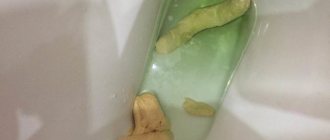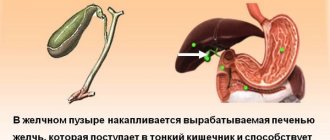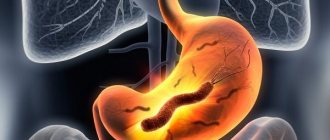Can there be loose stools with ARVI?
ARVI is a viral disease that is transmitted by airborne droplets. You can recognize ARVI yourself by symptoms such as a runny nose or nasal congestion with clear discharge. Soon after infection, the waste products of viruses poison the body, and the patient begins to suffer from fever, headaches, weakness and poor health in general.
Along with the mucous surfaces of the respiratory organs, the organs of the digestive system are also infected, so in children and adults with weak immunity, ARVI is often accompanied by diarrhea and vomiting. Due to intoxication of the body, the water-salt balance is disrupted and the function of the circulatory system, neuro-cerebral activity and heart rhythm deteriorate.
Causes
Diarrhea does not always occur with a cold. Abnormal bowel movements occur under the influence of provoking factors. In most cases, loose stool occurs during ARVI in a child, since children's immunity is much weaker than an adult's.
Causes of diarrhea during ARVI:
- adenovirus;
- intestinal flu;
- rotavirus infection;
- common flu;
- enterovirus.
The symptoms are unclear, since, in addition to disruption of intestinal functionality, a cold develops. The pathological condition may be a consequence of infection or the result of poisoning. To determine the diagnosis, differential diagnosis is necessary.
Diarrhea is also common with adenovirus.
How to distinguish viral diarrhea from poisoning
Viral diarrhea is similar to poisoning in a number of ways: nausea, vomiting, pain in the epigastric region, loss of appetite. However, the disease can be differentiated not only by laboratory tests, but also by careful analysis of the patient’s condition.
The characteristic differences between poisoning and diarrhea due to viruses are reflected in the table.
Symptoms of poisoning Signs of viral diarrhea
| Temperature does not rise | There is a fever. |
| The simultaneous presence of symptoms only in people consuming a low-quality product | The appearance of symptoms at the same or different times in several people who have household contact. |
| Strong-smelling, watery stool with food particles | During the first 24 hours, stools are frequent and have a sour odor. On the second day, the stool is clay-like and has a grayish-yellowish color. |
| Associated symptoms: flatulence, heaviness in the stomach, cramps, increased salivation | Associated symptoms: tearfulness, runny nose, sore throat and sore throat. |
| Reduced symptoms after bowel movements or vomiting | Periodic attacks of pain, regardless of bowel movements or vomiting. |
The danger of both types of disease is dehydration, which can lead to negative consequences. To avoid complications, treatment should begin at the initial stages of the manifestation of pathological processes.
Important! It is important to differentiate the disease, since drugs prescribed for diarrhea that occurs with ARVI harm the body and cause complications.
Treatment for adults
The basis of therapy for diarrhea during an acute viral infection is diet. It is recommended to give preference to light and liquid foods. You should also constantly drink small amounts of liquid. Decoctions of chamomile or rose hips, still mineral water or tea with lemon slices are useful.
Rice water can help treat diarrhea
Helpful information! To prevent diarrhea, drink rice water and eat thin oatmeal porridge for breakfast.
Medicines for diarrhea during ARVI in an adult:
- sorbents (Polysorb, Enterosgel);
- rehydrants (Citroglucosolan, Gastrolit);
- lacto- and bifidobacteria (Bifiform, Laktovit).
If after four days of taking medications and observing dietary restrictions, the patient’s condition does not improve, then you need to visit a specialist. Particular attention should be paid to the condition of the stool; if streaks of blood are detected, contact a medical facility immediately.
You can take sorbents, for example, Polysorb
Treatment of children
If a child develops diarrhea during ARVI, self-medication is not recommended. First of all, it is necessary to diagnose and determine the cause. Diarrhea threatens the child's body with severe dehydration already in the first day.
In order not to bring the child to a serious condition, if the child has a fever, you should immediately give Paracetamol and give him liquid every 10 minutes (in small portions).
To prevent dehydration in children, solutions of Regidron, Reosolan or Trihydron are used. Plain water, lemon tea or mineral water (still) are also suitable.
Since toxins accumulate in the body during diarrhea, sorbents are necessarily prescribed. Their action is complex and promotes the simultaneous removal of pathogenic microorganisms, as well as the protection of the gastrointestinal mucosa.
Regidron will help restore the water-salt balance
Medicines against diarrhea in children
Children take medications with the permission of a doctor. Comprehensive therapeutic measures include taking medications to prevent diarrhea and restore intestinal microflora.
Medicines for children against diarrhea:
- Smecta - can be taken for any type of diarrhea from birth, course - 5 days;
- Filtrum is a sorbent of natural origin (active ingredient is activated carbon), recommended from birth, course – 5 days;
- Enterodes – antidiarrheal sorbent based on povidone, course – 7 days;
- Enterosgel is a medicine from the group of sorbents containing methyl silicic acid, has an effect on the intestinal walls and prevents diarrhea, recommended from 1 year, course - 2 weeks.
Anti-diarrhea medications are taken from the first day. The interval between taking each medication should be at least two hours.
In addition to drug treatment, children should follow a diet for diarrhea due to ARVI, excluding the intake of harmful foods and sweets. It is recommended to give children binding products.
From this video you will learn about the signs and prevention of intestinal infections:
Prevention
Acute respiratory viral infection is a common form of the disease that often occurs in children and adults. Preventing infection is difficult. However, experts recommend several preventative measures:
- eat well;
- avoid mass gatherings during an epidemic;
- periodically take antiviral drugs;
- take vitamins regularly.
If, despite prevention, infection still occurs, you should begin to take measures from the first symptoms. If you have diarrhea in children, it is advisable to visit a doctor who will determine an individual treatment regimen and give the necessary recommendations.
If your child has cold symptoms with diarrhea, be sure to call a doctor.
Treatment of diarrhea should not end after stool restoration. Intestinal dysfunction may recur if you abruptly return to your previous diet.
What ARVI causes diarrhea?
The main causes of diarrhea are diseases of the digestive system, poisoning, long-term treatment with antibiotics, but loose stools can also be accompanied by ARVI, which at first glance seems strange.
Most often, ARVI is accompanied by diarrhea when infected with enterovirus. This is the name given to a large group of pathogens of viral diseases, because more often they initially penetrate the gastrointestinal tract, multiply there, then actively spread throughout the body and cause diseases of any organs, including the respiratory system. Some varieties of enterovirus immediately enter the respiratory system through airborne droplets and are causative agents of respiratory diseases.
Once in the body, enteroviruses can cause several combinations of symptoms. Among others, these may be signs of a flu-like syndrome, damage to the nasopharynx and at the same time nausea and diarrhea.
Enteroviruses have spread throughout the world and represent a huge part of the so-called picornoviruses. Infection occurs through the fecal-oral route, through consumption of contaminated food and water. Residents of countries with low levels of hygiene and a high degree of overpopulation are mainly susceptible to the disease.
Causes and symptoms of diarrhea due to colds
Medicine knows many types of colds, but the beginning is the same:
- coughing;
- prostration;
- increased body temperature;
- nausea;
- runny nose.
When the disease gains momentum and passes the initial stage, the severity of symptoms increases, which suggests a possible respiratory virus. Colds are viral in nature. Treatment is prescribed depending on the type of pathogen.
Flu
The type of disease has distinctive characteristics. Diarrhea with influenza is a common symptom. The infection enters through the respiratory tract, colonizes the stomach and actively multiplies in a favorable environment, poisoning the body. The pathogen is tenacious and difficult to eliminate using simple methods.
Rotavirus immediately disrupts the production of digestive enzymes necessary to break down complex sugars. As a result, carbohydrates accumulate in the intestines, attract fluid from the tissues and cause diarrhea.
Symptoms increase quickly. After a few hours, the state of health worsens, the patient experiences:
- general malaise;
- chest pain;
- nasal congestion;
- swelling of the mucous membranes of the mouth, nose, eyes;
- redness of the eye membranes;
- body temperature up to 40 degrees;
- headache;
- dry cough;
- diarrhea.
With dangerous respiratory viruses, swine and bird flu, in addition to loose stools, symptoms of vomiting, abdominal pain, and nausea are observed.
Feces and vomit have a specific appearance. Flu diarrhea contains water, but bile and blood are never detected.
Adenovirus
Those infected believe that the cold virus can only infect the nasopharynx area. The infection has the ability to penetrate the body, linger anywhere, and cause acute inflammation. The disease manifests itself with symptoms:
- Headache.
- Body temperature up to 38 degrees.
- Redness of the throat.
- Weakness.
- Enlarged lymph nodes.
- Cramps in the abdominal area.
- Loose stools up to 4-5 times a day.
Infection occurs by airborne droplets or oral-fecal transmission through dirty toys, surfaces, and water. Outbreaks occur in hospitals, summer camps, kindergartens, and schools.
When combined with adenovirus and diarrhea, complications develop. Inflammation of the meninges, cystitis, and bacterial complications are observed.
Fever
Elevated body temperature combined with diarrhea indicates inflammation as a result of an intestinal infection. The digestive system reacts sharply to the penetration of a microorganism and tries to cleanse itself of toxic secretions through diarrhea. The condition is dangerous if a person’s body is weakened by exacerbation of chronic diseases. The severity of the condition is influenced by pregnancy and childhood.
Bacteria and viruses enter the body through unwashed fruits, vegetables, water from open sources, and animals.
A bacterial or viral type of infection triggers the immune system, but while the force is activated, the activity of the gastrointestinal tract is disrupted. Treating it yourself is dangerous; you can get the wrong type of pest. Call a doctor at home.
Diarrhea is a sign of intoxication of the body. The longer it goes untreated, the more serious the health consequences.
Fever and diarrhea may be accompanied by nausea, fever, vomiting, and weakness. There is mucus and blood in the stool, and a color change may occur.
Rotavirus
The virus manifests itself as diarrhea. The disease affects the body quickly and is transmitted through the air, shared objects and the fecal-oral route. Affects the respiratory tract and intestines.
The outbreak occurs during the warm season.
Symptoms:
- abdominal pain;
- cough;
- nausea and vomiting;
- runny nose;
- temperature up to 38 degrees.
The younger the patient is, the more severe the disease.
Is there any poisoning here?
The virus, having penetrated the gastrointestinal tract, begins to multiply rapidly and in a very short time causes diarrhea in a person, followed by dehydration. But dehydration is a common symptom of diarrhea and poisoning, so it cannot be considered a differential sign.
Characteristic of infection
To suspect a viral infection, you need to pay attention to clinical signs in which symptoms resembling a flu-like state and acute inflammation in the intestines are simultaneously observed:
- heat;
- cough;
- white coating on the tongue;
- nasal congestion and redness;
- incessant rumbling in the stomach;
- pain when swallowing;
- loss of appetite;
- inflammation of the conjunctiva;
- nausea, vomiting;
- general weakness.
Acute respiratory viral infections (ARVI)
ARVI
– various acute infectious diseases resulting from damage to the epithelium of the respiratory tract by RNA and DNA containing viruses. Usually accompanied by fever, runny nose, cough, sore throat, lacrimation, symptoms of intoxication; may be complicated by tracheitis, bronchitis, pneumonia. Diagnosis of ARVI is based on clinical and epidemiological data confirmed by the results of virological and serological tests. Etiotropic treatment of ARVI includes taking antiviral drugs, symptomatic - the use of antipyretics, expectorants, gargling, instillation of vasoconstrictor drops into the nose, etc.
ARVI is an airborne infection caused by viral pathogens that mainly affect the respiratory system. ARVIs are the most common diseases, especially in children.
During periods of peak incidence, ARVI is diagnosed in 30% of the world's population; respiratory viral infections are many times higher in incidence than other infectious diseases. The highest incidence is typical for children aged 3 to 14 years.
An increase in incidence is observed in the cold season. The prevalence of infection is widespread.
https://www.youtube.com/watch?v=kOYTRaIgC9g
ARVIs are classified according to severity: mild, moderate and severe forms are distinguished. The severity of the course is determined based on the severity of catarrhal symptoms, temperature reaction and intoxication.
Acute respiratory viral infections (ARVI)
ARVIs are caused by a variety of viruses belonging to different genera and families. They are united by a pronounced affinity for the epithelial cells lining the respiratory tract. ARVI can be caused by various types of influenza viruses, parainfluenza, adenoviruses, rhinoviruses, 2 RSV serovars, and reoviruses.
The overwhelming majority (with the exception of adenoviruses) are RNA viruses. Almost all pathogens (except for reo- and adenoviruses) are unstable in the environment and quickly die when dried, exposed to ultraviolet light, and disinfectants.
Sometimes ARVI can be caused by the Coxsackie and ECHO viruses.
The source of ARVI is a sick person. Patients in the first week of clinical manifestations are most at risk.
Viruses are transmitted via the aerosol mechanism in most cases by airborne droplets; in rare cases, the implementation of a contact-household route of infection is possible.
The natural susceptibility of people to respiratory viruses is high, especially in childhood. Immunity after an infection is unstable, short-term and type-specific.
Treatment of diarrhea due to colds
If symptoms of ARVI appear, before examination and prescribing treatment by a doctor, you can take Paracetamol in a dosage appropriate for your age.
If it is determined that diarrhea due to colds in adults and acute respiratory viral infections is of a viral nature, you can use antiviral drugs in tablets: Anaferon, Ergoferon, Tsitovir. For children, medications and dosage should be prescribed by a doctor. Tablet drugs can be replaced with rectal antiviral suppositories based on interferon: Kipferon, Genferon, Viferon.
Antibiotics are useless in this case; they have no effect on viruses.
Antiemetic drugs: Cerucal, Motilium, Metoclopramide, Reglan, Rimantadine.
To prevent dehydration, it is recommended to drink more fluid in the form of regular clean water without gas, tea, compotes, rosehip infusions or herbs, which should be drunk in small sips, taking breaks of about 10 minutes, or after each bowel movement.
It is very good to start treating diarrhea by using special rehydration solutions to replenish the loss of fluid and salts of potassium, sodium, chlorine, and glucose in the blood, which are intensively removed from the body during diarrhea. Such products are sold in pharmacies without a prescription; you can prepare solutions from them at home according to the instructions and use them as indicated in the annotation.
Prevention
Respiratory diseases can cause diarrhea. It is extremely difficult to prevent infection, but it is possible. To do this you need:
- Eat well.
- Observe personal hygiene rules. Often, diarrhea during ARVI in a child begins due to the penetration of viruses transmitted by the fecal-oral route into the intestinal tract. From an early age, children should be taught to wash their hands after visiting the toilet and public places.
- During the epidemic, do not visit public places. If this is not possible, then it is recommended to lubricate the nasal passages with Oxolin ointment before going outside.
- Take antiviral drugs.
- Get flu shots. Usually vaccination is carried out from September to November, when there is no epidemic.
- Take vitamins regularly.
- To refuse from bad habits.
- Lead a healthy lifestyle.
If it was not possible to avoid the disease, so that diarrhea does not occur after ARVI, you should begin treatment from the first symptoms. It is important to prevent the development of complications and take all possible measures for the speedy recovery of the body.
( 1 ratings, average: 5.00 out of 5)
Diet
In case of diarrhea, the following should be excluded from the diet: any rich pastries, fresh milk, fermented milk products with a high percentage of fat, all fresh fruits and berries, smoked meats, fatty fried meat and fish, canned food and pickled foods.
The basis of nutrition should be cereal dishes cooked in water. Recommended cereals: rice, millet, buckwheat, semolina, oatmeal. Porridges are served without butter or sour cream. Dairy products you can eat: kefir 1%, yogurt, acidophilus, cottage cheese 1%.
Treatment
If it is difficult to make a diagnosis, the patient is prescribed tests: complete blood count, stool culture for microflora, ultrasound. If diarrhea develops against the background of a viral infection, first of all, treat the underlying disease. The treatment regimen is drawn up for each case separately. What drugs are prescribed to eliminate diarrhea during ARVI in adults:
- antimicrobial drugs with local intestinal action: Enterofuril Nifuroxazide, Stopdiar;
- antiviral drugs, immunostimulants: Echinacea, Derinat, Viferon, Groprinosin;
- sorbents: Activated carbon, Polysorb, Smecta, Atoxyl;
- rehydration mixtures: Gastrolit, Regidron, Orsol, Humana Electrolyte;
- antispasmodics and painkillers: Spasmolgon, No-shpa, Paracetamol;
- enzymes to improve digestion: Pancreatin, Creon;
- probiotics to restore intestinal microflora: Hilak, Bifiform, Linex.
Additionally, treatment is carried out with cough medicines in tablets and sprays (Strepsils, Faringosept, alcohol Chlorophyllipt). For difficult expectoration, mucolytic drugs Bromhexidine, Lazolvan, Ambroxol, syrups with plantain, and licorice root are prescribed. If there is a runny nose, vasoconstrictor sprays Tizin, Nazivin, Sanorin, Pinosol are used to restore nasal breathing. At temperatures above 38.5 degrees, take antipyretic Paracetamol, Panadol, Ibuprofen.
What is diarrhea?
Diarrhea, popularly called diarrhea, is a pathological condition in which the patient experiences frequent bowel movements. There are many reasons why a person suffers from loose stools:
- disruption of the stomach;
- food poisoning;
- stress;
- menstruation and hormonal changes;
- use of antibiotics and certain medications.
At the same time, loose stools sometimes occur with ARVI, although it seems that these two phenomena are incompatible.
Diarrhea causes disruption of the stomach, which leads to unpleasant symptoms.
Folk remedies
The older generation almost always prefers non-drug remedies, that’s a fact. Since ancient times, before the invention of tablets, all ailments were treated with medicinal plants and certain products. Two folk recipes are especially popular: rice water and strong sweet tea with breadcrumbs on an empty stomach.
They are considered to be universal for all cases of diarrhea. Sometimes you can hear advice that vodka with salt or a few peppercorns works great for diarrhea during ARVI in adults, but from a medical point of view, such a recipe threatens health. It is better to choose one of the following remedies.
Plantain
Famous for its expectorant properties. Many cough syrups contain plantain extract. But the plant also helps equally well with diarrhea, colitis, enterocolitis, and gastritis. The juice of fresh leaves contains astringents and anti-inflammatory substances. To prepare a medicine that stops diarrhea, plantain along with its cuttings are scalded with boiling water and squeezed well through gauze. Then you need to drink a tablespoon before meals 3 times a day, diluting it in half with water before use.
Collection of St. John's wort, chamomile, sage
Herbs have a powerful anti-inflammatory effect, suppress the activity of viruses and bacteria, and normalize intestinal activity. If you have loose stools due to a cold, it is enough to drink the mixture for 1-2 days. It is prepared as follows: mix 3 parts chamomile, 2 St. John's wort, 1 sage in a dry container, take a teaspoon of the mixture and brew 200 ml of boiling water. Take warm instead of tea 2 to 4 times a day.
Bird cherry
The fruits of the plant have immunostimulating, anti-inflammatory, antipyretic and bactericidal effects. In addition, bird cherry knits, that is, it stops diarrhea. Recipe for a medicinal decoction: pour 2 tablespoons of fruits into 500 ml of water, place in a water bath for 15 minutes. Let it brew for about an hour, then strain. Drink the product warm, 100 ml 3-4 times a day.
Revitalizing vitamin drink
The state of immunity directly affects the course of the disease. To increase the body's resistance to illness, it is recommended to enrich the diet with vitamins. The following recipe is especially good for restoring strength: crush 150 g of rose hips, add 1 liter of water, cook for 15 minutes, then immediately add 1 sliced lemon, 2 tablespoons of grated ginger root, a handful of raisins. After cooling, strain the drink through cheesecloth into 5-7 layers, sweeten with 50g of honey. Drink 100 ml throughout the day.
The opinion that diarrhea occurs only due to poisoning is fundamentally incorrect. Respiratory viruses can infect the intestines, but this happens under certain conditions: good strain viability, microflora imbalance, chronic diseases of the digestive system, reduced immunity. This is the answer to the question whether diarrhea can occur with ARVI. Be that as it may, if the disorder begins in a child, you need to give him water more often, and contact your pediatrician for prescription medications. The onset of diarrhea against the background of ARVI in adults is not so dangerous. In the first 2 days, you can try to heal on your own. If there is no improvement, you need to go to a therapist, gastroenterologist or infectious disease specialist.
Symptoms
Each disease begins to be diagnosed with clinical symptoms. To do this, the doctor conducts a survey, paying attention to information received from the parents and the child himself. Complaints are detailed and supplemented by physical examination data: examination, palpation of the abdomen. And based on the information received, a preliminary conclusion is made.











